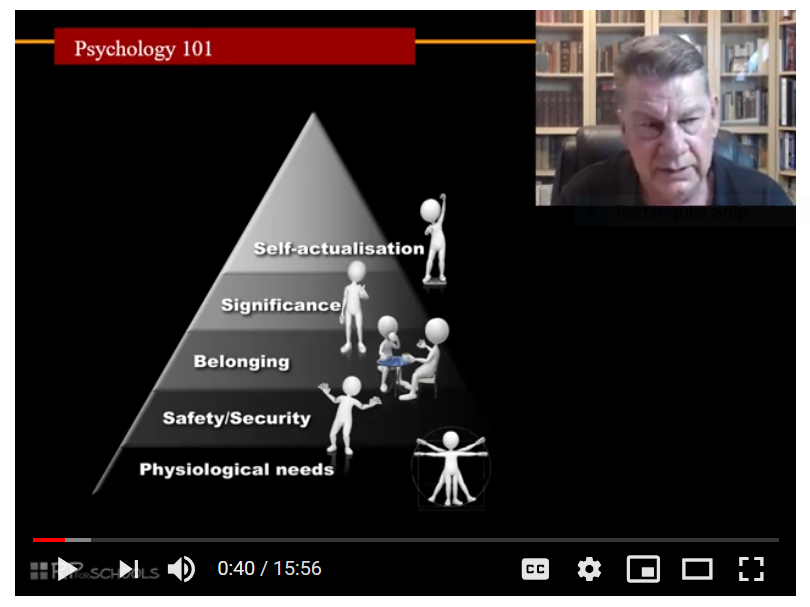Video Link: https://www.youtube.com/watch?v=rlSpLlddGwk
Presentations, Papers & Professional Development Workshops Graeme George
Graeme George
I have made presentations and delivered Professional Development Workshops and Seminars to teachers in many Australian schools, and worked with school leaders on their Restorative Practices and Teaching and Learning implementation and reform plans. Just some of the Presentations, Conference papers and Workshops I have presented are listed below.
If I can be of any assistance as an experienced 'critical friend', please contact me.
FREE eBOOK
 Teaching
with Mind and Heart: Affect in the Restorative
School [eBook]
George, GB [2016]
Teaching
with Mind and Heart: Affect in the Restorative
School [eBook]
George, GB [2016]
This free eBook outlines how the insights of
affect script psychology can have direct,
immediate application to the moral, emotional
work of teachers in schools, both in the area of
behaviour and relationship management through
restorative practices, and in the teaching and
learning process in the classroom.
Download the free eBook here.
|
|
|
Posted here are some video walkthroughs of presentations I have made to various school groups or at conferences. These are not professionally produced videos - rather they are one-take "rehearsals" of the presentations recorded using Microsoft Mix, converted to video. What is Relational Pedagogy? Video Link: https://www.youtube.com/watch?v=rlSpLlddGwk Why RP?
Video Playlist link: https://www.youtube.com/playlist?list=PLE9eCkNMxs6SrkEXzsbkKZAAoCmWsfSkK Notes from the Presentation [in pdf form]
Shame and Guilt - Affect and the Moral Emotions: Respecting our Biology and Writing our Biography
Video Playlist link: https://www.youtube.com/playlist?list=PLE9eCkNMxs6T8tsQmNKghGWu3QBdxVjbD |
The Emotional Aspects of Learning George, GB [2017] - A presentation for use with students
 This
powerpoint presentation can be used to introduce older
students to the impact emotions can have on their
learning, how this can go wrong, and what they can do to
benefit from this understanding. The presentation
focuses on the importance of shame affect
to the learning process, our usual 'Compass of Shame'
responses, and how we can apply strategies to recover
from shame affect once it is triggered, and use it to
our advantage in our learning.
Shame affect is critical to
the learning process - it's there to make us aware when
we don't understand something, when we need to work at
understanding the topic better. But, it leads to painful
emotions, and can easily sidetrack us in our learning
and study, making us feel as if we're not succeeding.
Students can learn to harness shame affect
and practise strategies to
work through the negative experience in order to regain
interest and
enjoyment in their learning.
The presentation is available here in
pdf [4MB] and
pptx [23MB]
format. The pptx file can be freely modified to suit
your presentation and audience.
This
powerpoint presentation can be used to introduce older
students to the impact emotions can have on their
learning, how this can go wrong, and what they can do to
benefit from this understanding. The presentation
focuses on the importance of shame affect
to the learning process, our usual 'Compass of Shame'
responses, and how we can apply strategies to recover
from shame affect once it is triggered, and use it to
our advantage in our learning.
Shame affect is critical to
the learning process - it's there to make us aware when
we don't understand something, when we need to work at
understanding the topic better. But, it leads to painful
emotions, and can easily sidetrack us in our learning
and study, making us feel as if we're not succeeding.
Students can learn to harness shame affect
and practise strategies to
work through the negative experience in order to regain
interest and
enjoyment in their learning.
The presentation is available here in
pdf [4MB] and
pptx [23MB]
format. The pptx file can be freely modified to suit
your presentation and audience.
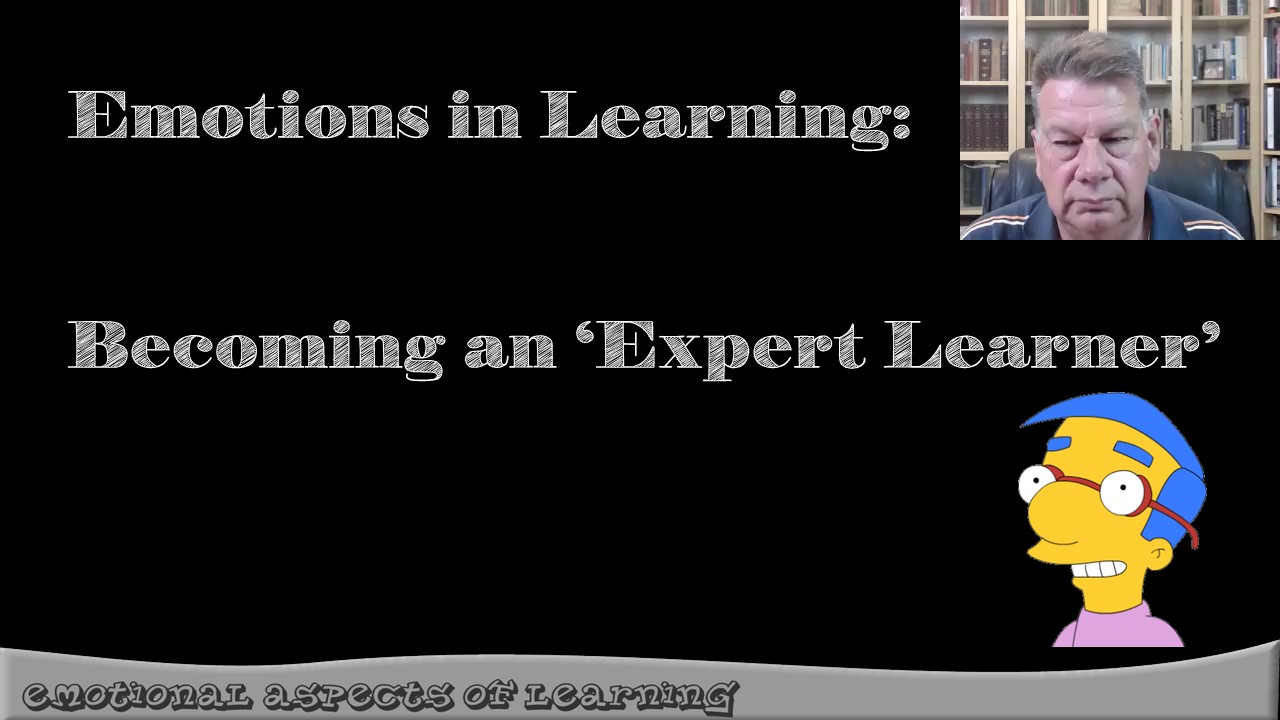 A
video walkthrough of this 25 minute presentation is
available on the RPforSchools YouTube Channel at:
https://youtu.be/ApN8uWQIY4Y
A
video walkthrough of this 25 minute presentation is
available on the RPforSchools YouTube Channel at:
https://youtu.be/ApN8uWQIY4Y
Why Restorative Practices? George, GB [2016]
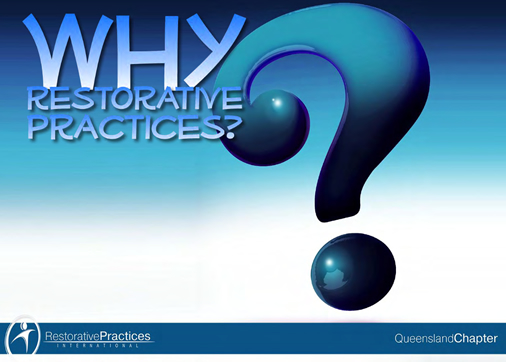 Keynote
address given at the RPI.QLD State Conference 2016, held
at Villanova College, Brisbane on Monday 17th October
2016. In this address, Graeme presented a case that we
try to work restoratively because we are teachers - that
RP is in alignment with the essential nature of our role
as teachers. [Slides
used in the Presentation pdf]
Keynote
address given at the RPI.QLD State Conference 2016, held
at Villanova College, Brisbane on Monday 17th October
2016. In this address, Graeme presented a case that we
try to work restoratively because we are teachers - that
RP is in alignment with the essential nature of our role
as teachers. [Slides
used in the Presentation pdf]
Teaching with Mind and Heart: Affect & Emotion in the Restorative School. George, GB [2015]
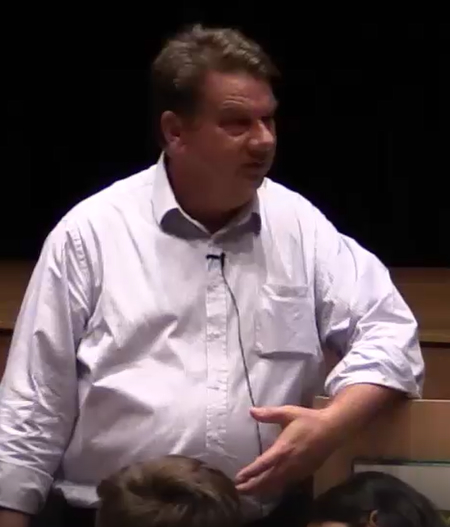 This
Half-Day Workshop was given at the fifth Restorative Practices International Conference
in Hobart in March 2015, and again in Adelaide for
RPI South Australia. Understanding the biology of
human emotion, motivation and cognition can give
teachers valuable insights into behavioural issues,
how restorative approaches can work so well to build
and nurture relationships in a school, and how
emotions affect learning. This half-day workshop
drew from research in psychology, neuroscience, and
education to help us better understand our emotional
lives, and those of our students; and in particular,
the important role that the moral emotions shame,
guilt and empathy play in human development. These
understandings were integrated in order to explore
human behaviour and motivation, how restorative
processes can work better, and how best to build
psychological resilience while promoting the
development of higher-order learning skills in our
students. The psychology of the learning process
itself was explored to help envision a relational
pedagogy through which teachers can challenge
students to higher levels of academic achievement
and fulfilment through strong, supportive classroom
relationships. [Notes
from the Presentation pdf]
This
Half-Day Workshop was given at the fifth Restorative Practices International Conference
in Hobart in March 2015, and again in Adelaide for
RPI South Australia. Understanding the biology of
human emotion, motivation and cognition can give
teachers valuable insights into behavioural issues,
how restorative approaches can work so well to build
and nurture relationships in a school, and how
emotions affect learning. This half-day workshop
drew from research in psychology, neuroscience, and
education to help us better understand our emotional
lives, and those of our students; and in particular,
the important role that the moral emotions shame,
guilt and empathy play in human development. These
understandings were integrated in order to explore
human behaviour and motivation, how restorative
processes can work better, and how best to build
psychological resilience while promoting the
development of higher-order learning skills in our
students. The psychology of the learning process
itself was explored to help envision a relational
pedagogy through which teachers can challenge
students to higher levels of academic achievement
and fulfilment through strong, supportive classroom
relationships. [Notes
from the Presentation pdf]
Graeme George Presenting
-
Restorative Practices' focus on relationships is echoed in the Catholic tradition of justice, the scriptural tradition, and the Church's Social Teaching. This paper explores the way in which restorative approaches in schools enables teachers to participate in an active ministry of reconciliation, more closely living the values of their faith community. Read the paper here
-
An extended version of this paper which also addresses the particular charism of an Augustinian school, and its fit with Restorative Practices is available here. Read the Augustinian version of this paper here.
-
Video Presentation: Because We Are Teachers - RP in an Augustinian Catholic School (Graeme George, 2016) This presentation explores the ways in which Restorative Practices enables us to live out our vocation as teachers in the service of the Mission and Vision of an Augustinian Catholic school. https://youtu.be/Q3QLM4gytkI
-
This article introduces the reader to the theory of Affect and Script Psychology developed from the work of Silvan S Tomkins, an American Psychologist and Philosopher of the late Twentieth Century. Tomkins's work explores the biological basis for affect and emotion and gives striking insights into what motivates human behaviour both individually and in groups. Central to this understanding is Tomkins's description of nine innate affects and how our emotional life is built from these into scripts which guide our behaviour. The Shame family of emotions is particularly relevant in human relationships. Read the paper here
|
Affect and Emotion in a Restorative School. [2014]
This chapter explores the application of Affect Script Psychology to understanding the emotional dynamics of the learning process in the classroom. It proposes a framework for understanding the shame involved in learning, and how the teacher might work alongside learners to help them develop resilience and stay engaged, even when the subject matter is quite daunting. Insights into the complex emotions involved in education provide a template for educators at all levels to get the best out of their students. Jessica Kingsley Publishers. |
|
Restorative Practices involving Adults in Schools. [2014]
This presentation introduced delegates to the fundamentals of Restorative Practices in schools, its philosophy and practice, before exploring how this approach can be used to deal with adult wrongdoing and conflict in the school environment. The concept of a Workplace Conference to deal with conflict or generalised dysfunction in teacher teams was explored before extending the philosophy to those more informal interactions school personnel have with colleagues and parents. The emotional dynamics of these interactions gave insights into how we can productively deal with conflict and confrontation within the workplace. Presentation slide here. [pdf 7MB] |
|
Affect and Emotion in the Restorative School. [2014]
Understanding the biology of human emotion gives teachers valuable insights into behavioural issues, and how restorative approaches can work so well to build and nurture relationships in a school. This workshop drew from a number of areas in psychology to help participants better understand human behaviour and motivation, how restorative processes work, and how to build psychological resilience and develop learning skills. The psychology of the learning process was explored to help develop a pedagogy that builds relationship while challenging students to academic success. The accompanying notes for this Workshop can be found here. [pdf 400kB] |
Affect and Emotion in the Restorative School. [2013]
- This workshop was presented at the Restorative Practices International "Broadening Restorative Perspectives" Conference in June, 2013 in Melbourne Australia [accompanying Powerpoint presentation 2MB] The full paper can be found here.
Navigating beyond the Compass: Shame, Guilt and Empathy in RP. [2011] [Paper pdf file 0.17MB]
- This paper was presented at the 5th Restorative Justice Aotearoa National and 3rd Restorative Practices International Conferences, 23 – 27 November 2011, Wellington, NZ. [accompanying Powerpoint presentation 11MB]
"RP@V: One School's Journey" [2008] [pdf file 0.6MB]
- This presentation was given at the Edmund Rice Education Australia Conference - Restorative Justice and Building Effective Relationships for Teaching and Learning held at Riverglenn Conference Centre, Indooroopilly, on Monday 8th September 2008. The pdf file is a paper of the presentation given in the Workshop.
"RP@V: Conference to Classroom to Playground" [2007] [ppt file 14.8MB] [pdf file 3.2MB]
- This presentation was given at the inaugural Restorative Practices International (RPI) conference "Best Practice in Restorative Justice: Transformational Change"held on the Sunshine Coast in October, 2007. The views expressed in the presentation reflect the thoughts of the presenters. For privacy reasons, photos of students originally included in the presentation have been removed. Bibliography for this presentation. - [pdf 12kB]
"In Mind and Heart: One School's Journey into Restorative Practices" [2005 & 2006] [pdf file 1.6MB]
- This presentation was made to the International Institute for Restorative Practices (IIRP) Sixth International Conference: "Building a Global Alliance for Restorative Practices and Family Empowerment" March, 2005, Penrith, NSW.
- This workshop was also presented at the International Congress for Augustinian Educational Institutes conducted in Rome in 2006.
Restorative Practices - Professional Development
Some of the PD Workshops I have developed for particular schools include:
RP101 - Theory, Philosophy & Practice: "This introductory workshop explores the philosophy and practice of Restorative Practices and the connections to our Augustinian charism, drawing on the work of the pioneers in the field and our own experience. The workshop covers the aims, objectives and methods of RP as well as some key related issues such as shame management, identity-formation and community-building through strong, healthy relationships. RP101 builds on the issues presented in the Staff Induction program and through the sessions conducted for all staff on the Staff Days, and assumes some working familiarity with the field of RP. As such, it is a suitable workshop for those ready to take their learning in this area a little further, or as a ‘refresher’ for those who have been working in RP for some time."
RP102 - The Framework in Action: "This workshop builds on RP101 to enable participants to explore some specific practices within the RP field in order to strengthen their ability to work restoratively with students, parents and teachers. The workshop aims for deeper insights into the Restorative approach through examining the use of the Community Conference, the use of circles in building community within classrooms and a particular technique for ‘Restorative Interviewing’. This advanced workshop challenges us to explore our own practice by learning more about the specific techniques of RP and examining why and how they are successful in encouraging behavioural change. It follows on from RP101 and assumes a greater familiarity with the basics of the philosophy and practice of RP."
RP201 - Conference Facilitator Training Program: "This intensive four-session program aims to give participants a deeper understanding of the Community Conference process through developing the skills to actually conduct restorative conferences where incidents of misconduct warrant them. This practical program includes demonstration and practice of the structured conference meeting, understanding and managing of the emotional dynamics in these meetings, and planning around implementation issues. This four-session program is designed to give participants the necessary background and initial skills to become a member of our Conference Facilitation team, but would benefit anyone interested in a deeper understanding of the dynamics of RP. On successful completion of this program, participants could be able to gain further practical experience by co-facilitating conferences with a more experienced leader, eventually being able to conduct conferences themselves. Others might simply be interested in gaining a fuller understanding of the Conference process without the intention of facilitating them themselves."
RP301 - Affect Script Psychology: Shame, Guilt and Empathy development: "This advanced workshop begins with a detailed exploration of Affect Script Psychology in order to better understand human behaviour, including human motivations and the requirements for contented, fulfilled individuals and groups. The workshop then considers the shame family of emotions and, in particular, the difference between shame and guilt. Recent psychological research suggests a critical difference between these oft-confused emotions - a difference which can lead to differing life-long consequences for those prone to shame versus those prone to guilt. Finally, the workshop explores ways in which our students’ experience of schooling - in the classroom, in the playground and on the sporting field - can be structured so as to best promote mental health and a positive, developing conscience."
 An Introduction to the
Philosophy & Practice of Restorative Practices:
This workshop was designed to introduce (and re-introduce) a school
staff group to the philosophy of Restorative Practices in order to prepare
for more detailed work on developed restorative skills. It was conducted for
a whole-staff group of approximately 40 teachers and administrators in a
rural school. The Workshop was followed up on the second day by work on
extending this philosophy and practice into the classroom. In particular,
the role of the emotions in the learning process was explored with the
staff.
An Introduction to the
Philosophy & Practice of Restorative Practices:
This workshop was designed to introduce (and re-introduce) a school
staff group to the philosophy of Restorative Practices in order to prepare
for more detailed work on developed restorative skills. It was conducted for
a whole-staff group of approximately 40 teachers and administrators in a
rural school. The Workshop was followed up on the second day by work on
extending this philosophy and practice into the classroom. In particular,
the role of the emotions in the learning process was explored with the
staff.
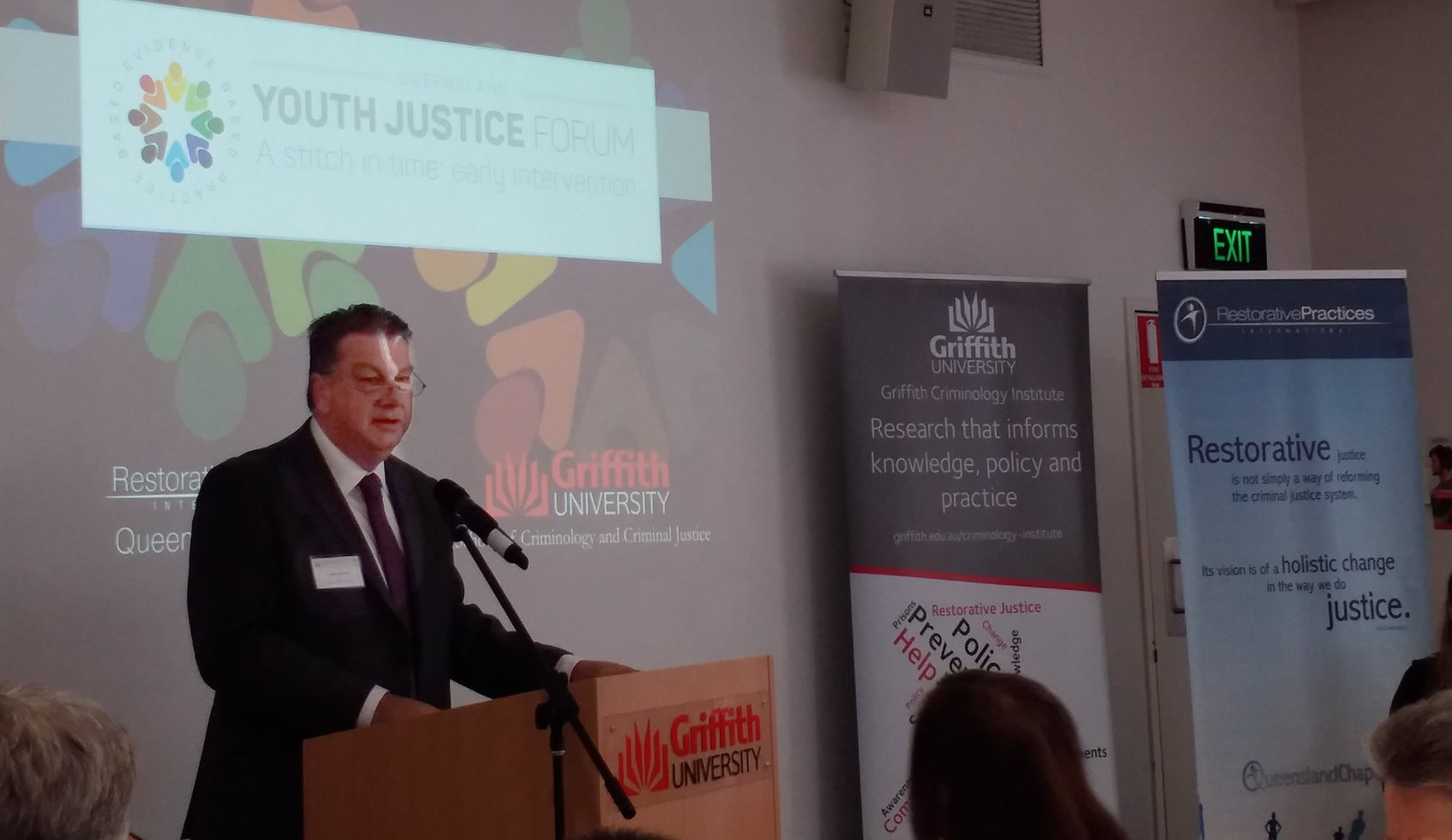
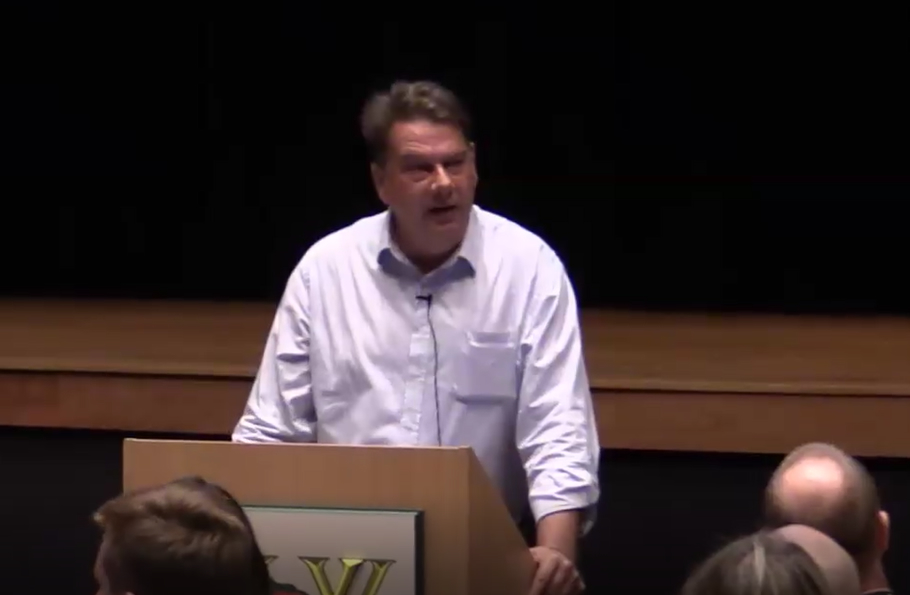
Graeme George at the Youth Justice Forum 2017 Graeme George Presenting a Lecture

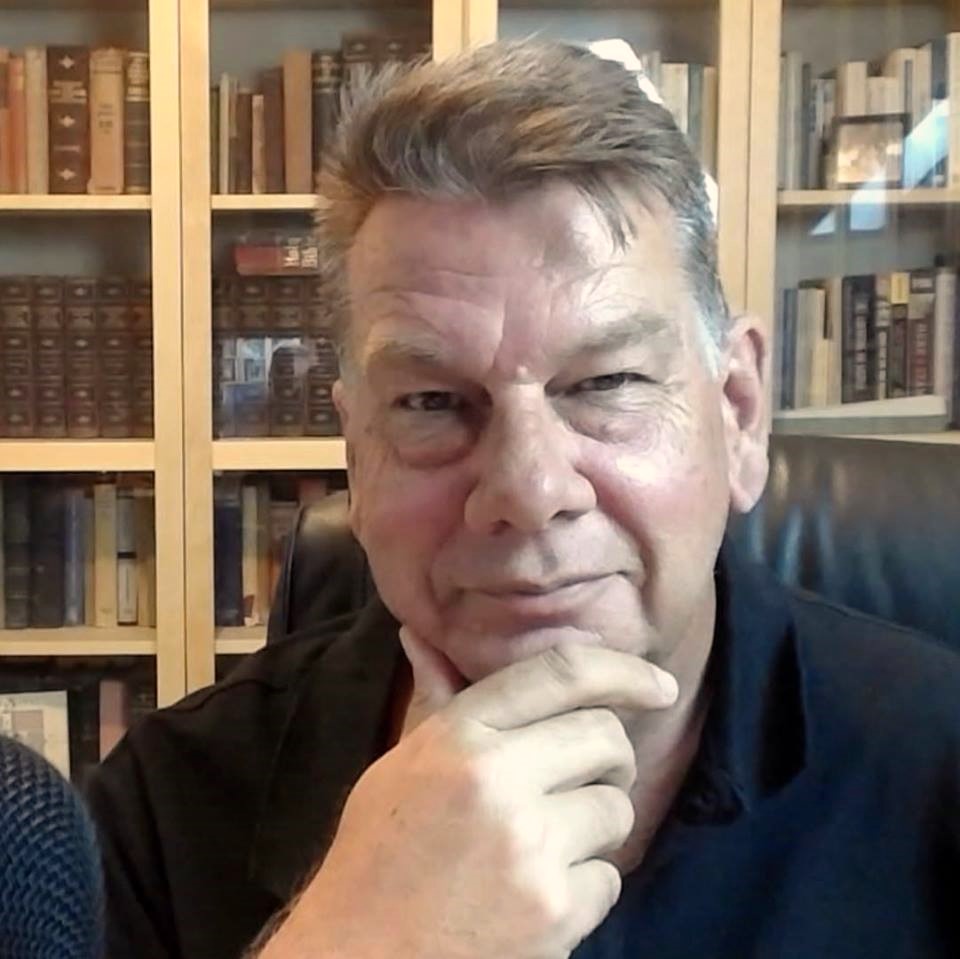 VIDEO
PRESENTATIONS - WALKTHROUGHS
VIDEO
PRESENTATIONS - WALKTHROUGHS
